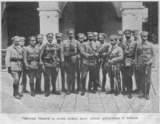
Polish Legions in World War I
Encyclopedia

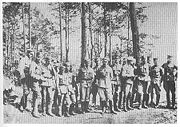
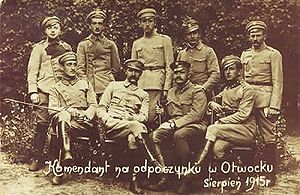
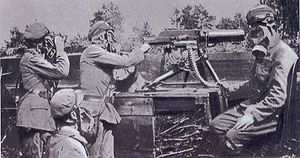
Austro-Hungarian Army
The Austro-Hungarian Army was the ground force of the Austro-Hungarian Dual Monarchy from 1867 to 1918. It was composed of three parts: the joint army , the Austrian Landwehr , and the Hungarian Honvédség .In the wake of fighting between the...
. They were composed mostly of former members of various scouting
Scouting
Scouting, also known as the Scout Movement, is a worldwide youth movement with the stated aim of supporting young people in their physical, mental and spiritual development, that they may play constructive roles in society....
organisations, including Drużyny Strzeleckie and Związek Strzelecki
Zwiazek Strzelecki
Związek Strzelecki "Strzelec" was a Polish paramilitary cultural and educational organization created in 1910 in Lwów as a legal front of Związek Walki Czynnej, and revived in Poland in 1991....
, as well as volunteers from all around the empire.
Józef Piłsudski in his order of 22 August declared formations of the Legions, but Austrian government officially agreed to it only on 27 August.
Initially the Polish Legions were composed of two legions: the Eastern and the Western, both formed on 27 August. After Russian victory in the Battle of Galicia Eastern Polish legion refused to fight against Russia and was disbanded on 21 September. On 19 December Western legion was transformed into three brigade
Brigade
A brigade is a major tactical military formation that is typically composed of two to five battalions, plus supporting elements depending on the era and nationality of a given army and could be perceived as an enlarged/reinforced regiment...
s.
- I Brigade of the Polish LegionsI Brigade of the Polish LegionsBrigade I of the Polish Legions was a unit of Austro-Hungarian Army, manned by Austrian Poles, part of the Polish Legions in World War I, existing from 1914 to 1917.-History:...
under Józef Piłsudski, formed in mid-December - II Brigade of the Polish Legions under Józef Haller de HallenburgJózef Haller de HallenburgJózef Haller de Hallenburg was a Lieutenant General of the Polish Army, legionary in Polish Legions, harcmistrz , the President of The Polish Scouting and Guiding Association , political and social activist, Stanisław Haller de Hallenburg's cousin.Haller was born in Jurczyce...
, formed between mid-December and March (sources vary) - III Brigade of the Polish Legions under Zygmunt Zieliński and later Bolesław Roja, formed on 8 May 1915
- Artillery Battalions-served in I, II, and III Brigades
- Cavalry Regiments-1st served in I Brigade; 2nd served in II Brigade; 3rd served in III Brigade
- Infantry Regiments-1st, 5th, 7th served in I Brigade; 2nd, 3rd served in II Brigade; 4th served in both II and III Brigades; 5th, 6th served in III Brigade
The commanders of the Legions were:
- Gen. Karol Trzaska-Durski (September 1914 – February 1916)
- Gen. Stanisław Puchalski (until November 1916)
- Col. Stanisław Szeptycki (until April 1917)
- Col. Zygmunt Zieliński (until August 1917)
The Legions took part in many battles against the forces of Imperial Russia, both in Galicia and in the Carpathian Mountains. Initially both the number of troops and the composition of units were changing rapidly. This changed after Piłsudski resigned his post in September 1916 and the Polish Legions were renamed to Polish Auxiliary Corps (Polski Korpus Posilkowy). In June 1916 the unit had approximately 25 000 soldiers.
After the Act of November 5 and the creation of puppet Kingdom of Poland, the Polish Legions were transferred under German command. However, most of the members of legionists refused to swear allegiance to the emperor and were interned in Beniaminów
Beniaminów
Beniaminów is a village in Poland. It has approximately 190 inhabitants and is located in the Masovian Voivodship, east of Warsaw, between Legionowo and Nieporęt.Within the village are remnants of a 19th-century fort....
and Szczypiorno
Szczypiorno
Szczypiorno is a municipal neighbourhood of the city of Kalisz, Poland. Formerly until 1976 a separate village at the outskirts of the city, it is best known as a seat of a World War I and Polish-Bolshevist War prisoner of war camp and the name-sake for szczypiorniak, the Polish language name for...
(Oath crisis
Oath crisis
The Oath crisis was a World War I political conflict between the Imperial German Army command and the Józef Piłsudski-led Polish Legions.Initially supporting the Central Powers against Imperial Russia, Piłsudski wanted to defeat one of the partitioning powers with the hands of the two remaining...
). Approximately 3 000 of them were drafted into the Austro-Hungarian army or the German Polnische Wehrmacht
Polnische Wehrmacht
Polska Siła Zbrojna, was a military formation created by Imperial Germany during World War I, as the armed forces of their puppet Kingdom of Poland. Polska Siła Zbrojna was established a part of the German Army, under German command...
and sent to the Italian Front, while approximately 7 500 stayed in the Austrian Polish Auxiliary Corps
Polish Auxiliary Corps
Polish Auxiliary Corps was the name of the Polish military formation in the Austro-Hungarian Army, based on the Polish Legions. It was created in the aftermath of the Oath crisis from the Legions on 20 September 1916 and existed until 19 February 1918...
.
After the war the officers of the Polish Legions became the backbone of the Polish Army.
Battles
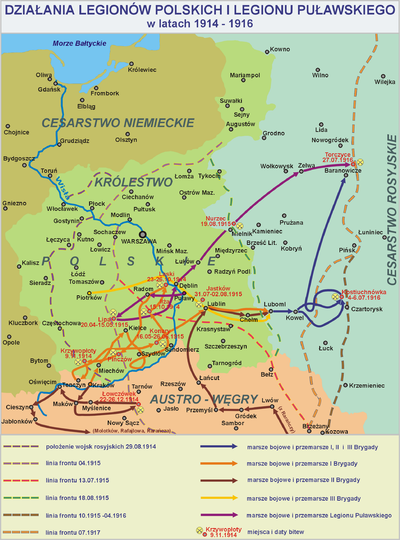
- Battle of Nowy Korczyn (23–24 September 1914)
- Battle of Anielin-Laski (October 21–October 26, 1914)
- Battle of Mołotkowo (October 29, 1914)
- Battle of Krzywopłoty (17–18 November 1914)
- Battle of Marcinkowice (5–6 December 1914)
- Battle of ŁowczówekBattle of ŁowczówekBattle of Łowczówek was a battle during World War I, fought on 22–25 December, between the First Brigade of the Polish Legion, fighting for Austria-Hungary, and troops of Imperial Russia...
(December 22–December 25, 1914) - Battle of Pustki (2 May 1915)
- Battle of KonaryBattle of KonaryKonary is a small village in the region of Sandomierz Uplands, near the town of Klimontów, Poland.-History:During the Great War, in May and June 1915 it was a site of a major battle between the Russian Army and the forces of Józef Piłsudski's Polish Legions...
(May 16–May 25, 1915) - Battles of Rafajłowa, Kirlibaba and RarańczaBattle of RaranczaThe Battle of Rarańcza was fought between Polish Legionnaires, and Austria-Hungary, from February 15 to 16, 1918, near Rarańcza in Bukovina, and ended with a Polish victory.-Background:...
(June 13, 1915) - Battle of Rokitna (15 June 1915)
- Battle of Jastków (July 29–July 31, 1915)
- Battle of KostiuchnówkaBattle of KostiuchnówkaThe Battle of Kostiuchnówka took place from July 4 to July 6, 1916, near the village of Kostiuchnówka and the Styr River, in the Volhynia region of modern Ukraine, then part of the Russian Empire...
(July 4–July 6, 1916) - Battle of Krechowce (24 July 1917)
- Battle of RarańczaBattle of RaranczaThe Battle of Rarańcza was fought between Polish Legionnaires, and Austria-Hungary, from February 15 to 16, 1918, near Rarańcza in Bukovina, and ended with a Polish victory.-Background:...
(15–16 February 1918)
Officers who served in the Polish Legions
- Leon BerbeckiLeon BerbeckiLeon Berbecki was a Polish army officer, who fought in the Russo-Japanese War and World War I with the Imperial Russian Army. Following the foundation of the Second Polish Republic, Berbecki served in the Polish Army.- Early life :Peter Leon Berbecki, born on a farm in Kalinowszczyzna in what is...
- Zygmunt BerlingZygmunt BerlingZygmunt Henryk Berling was a Polish general and politician. He fought for the independence of Poland in the early 20th century. During Second World War he was sentenced to death in absentia for desertion from the Polish Army of General Władysław Anders...
- Władysław Bortnowski
- Walerian CzumaWalerian CzumaWalerian Czuma was a Polish general and military commander. He is notable for his command over a Polish unit in Siberia during the Russian Civil War and the commander of the defence of Warsaw during the siege of that city in 1939.-Biography:...
- Bolesław Wieniawa-Długoszowski
- Gustaw Orlicz-DreszerGustaw Orlicz-DreszerGustaw Konstanty Orlicz-Dreszer was a Polish general, and a political and social activist.Before World War I, Orlicz-Dreszer was involved in pro-independence activities in partitioned Poland. In 1914-17 he served in the 1st Brigade of the Polish Legions. He was arrested during the Oath Crisis...
- Bolesław Bronisław Duch
- Karol Durski-TrzaskaKarol Durski-TrzaskaKarol Durski-Trzaska was an officer in Austro-Hungarian Army and later, Polish Army. Reached the rank of Lieutenant General in Austrian-Hungarian Army; commander of Austrian Polish Legions in World War I from 23 September 1914 to December 1915. Transferred to reserve afterwards...
- Kazimierz FabrycyKazimierz FabrycyKazimierz Fabrycy was a Polish general. Fabrycy was a member of the Polish Legions in World War I, and fought in the Polish Soviet War. He was the Viceminister of military affairs from 1926 to 1934, and commander of several infantry divisions during the interwar period in the Second Polish Republic...
- Emil August FieldorfEmil August FieldorfEmil August Fieldorf was a Polish Brigadier General. He was Deputy Commander-in-Chief of the Home Army or AK, after the failure of the Warsaw Uprising...
- Stanisław Grzmot-Skotnicki
- Tadeusz Jordan-RozwadowskiTadeusz Jordan-RozwadowskiTadeusz Jordan-Rozwadowski was a Polish military commander, diplomat, and politician, a general of the Austro-Hungarian Army and then the Polish Army.- Youth :...
- Michał Karaszewicz-Tokarzewski
- Tadeusz KasprzyckiTadeusz KasprzyckiTadeusz Kasprzycki was a member of the Polish Legions in First World War, general of the Polish Army from 1929 and Minister of Military Affairs of Poland from 1935 to 1939....
- Franciszek KleebergFranciszek KleebergFranciszek Kleeberg was a Polish general. He served in the Austro-Hungarian Army before joining the Polish Legions in World War I and later the Polish Army. During the German Invasion of Poland he commanded Independent Operational Group Polesie...
- Tadeusz KlimeckiTadeusz KlimeckiTadeusz Klimecki - Lieutenant of the Imperial and Royal Army, Brigadier General of the Polish Army, Chief of Polish General Staff.-Early life and service in the Imperial and Royal Army:...
- Bronisław Prugar-Ketling
- Alojzy Wir-KonasAlojzy Wir-KonasAlojzy Wir-Konas was a Polish military commander and a Colonel of the Polish Army. Divisional commander during the Invasion of Poland, he was murdered in the Katyn massacre....
- Wincenty KowalskiWincenty KowalskiWincenty Kowalski was a Polish military commander and a general of the Polish Army. A veteran of both the World War I and World War II, he fought in all the inter-war conflicts of Poland...
- Marian KukielMarian KukielMarian Włodzimierz Kukiel pseudonym: Marek Kąkol, Stach Zawierucha was a Polish general, historian, social and political activist....
- Kazimierz Orlik-Łukoski
- Kazimierz MastalerzKazimierz MastalerzKazimierz Władysław Mastalerz was a Polish military commander of the 18th Pomeranian Cavalry Regiment....
- Mieczyslaw Norwid-NeugebauerMieczyslaw Norwid-NeugebauerMieczyslaw Norwid-Neugebauer was a minister in the interwar Polish government, and a major general in the Polish Army.-Life:...
- Leopold OkulickiLeopold OkulickiGeneral Leopold Okulicki was a General of the Polish Army and the last commander of the anti-German underground Home Army during World War II. He was murdered after the war by the Soviet NKVD....
- Witold PileckiWitold PileckiWitold Pilecki was a soldier of the Second Polish Republic, the founder of the Secret Polish Army resistance group and a member of the Home Army...
- Tadeusz PiskorTadeusz PiskorTadeusz Piskor was a Polish Army general.Before World War I, he was a member of Polish pro-independence organizations. During World War I he served in the Polish Legions, and subsequently fought in the 1919–21 Polish-Soviet War....
- Władysław Belina-Prażmowski
- Bronisław Rakowski
- Bolesław Roja
- Juliusz RómmelJuliusz RómmelJuliusz Karol Wilhelm Józef Rómmel was a Polish military commander and a general of the Polish Army. During the Polish-Bolshevik War, he gained great fame for achieving a decisive victory in the Battle of Komarów, the largest cavalry engagement of the 20th century...
- Stanisław Grzmot-Skotnicki
- Piotr SkuratowiczPiotr SkuratowiczPiotr Skuratowicz was a Polish military commander and a General of the Polish Army. A renowned cavalryman, he was arrested by the NKVD and murdered in the Katyn massacre....
- Edward Rydz-Śmigły
- Mieczysław Smorawiński
- Kazimierz SosnkowskiKazimierz SosnkowskiKazimierz Sosnkowski was a Polish independence fighter, politician and Polish Army general.-Life:Sosnkowski served successively as founder and first commander of Związek Walki Czynnej , chief of staff of the 1st Brigade of the Polish Legions, Polish minister of military affairs, vice-president of...
- Mieczysław Boruta-Spiechowicz
- Julian StachiewiczJulian StachiewiczBrigadier General Julian Stachiewicz was a Polish Army officer and a historian and writer.-Life:Julian Stachiewicz was the brother of General Wacław Stachiewicz....
- Wacław Stachiewicz
- Kazimierz Stamirowski
- Aleksander StawarzAleksander StawarzAleksander Stawarz codename: Leśnik, Baca was a Polish Army Colonel.In the First World War Stawarz served in Polish Legions...
- Zygmunt Bohusz-SzyszkoZygmunt Bohusz-SzyszkoZygmunt Piotr Bohusz-Szyszko was a Polish general. During World War I he served in the Imperial Russian army....
- Władysław Wejtko
- Józef Olszyna-WilczyńskiJózef Olszyna-WilczynskiJózef Konstanty Olszyna-Wilczyński was a Polish general and one of the high-ranking commanders of the Polish Army. A veteran of World War I, Polish-Ukrainian War and the Polish-Bolshevik War, he was murdered by the Soviets during the Polish Defensive War of 1939.-Early life:Józef Wilczyński was...
- Jan Włodarkiewicz
- Józef ZającJózef ZajacJózef Ludwik Zając was a Polish general and pilot.-Biography:Born on 14 March 1891 in Rzeszów, Józef Zając studied at the Jagiellonian University in Kraków, graduating with a PhD in philosophy in 1915...
- Ferdynand ZarzyckiFerdynand ZarzyckiFerdynand Zarzycki was a Polish general and politician. He fought in the Polish Legions in World War I. From 1933 to 1934 he was a Minister of Trade and Industry in the Polish government. He retired in 1934....
- Marian Januszajtis-ŻegotaMarian Januszajtis-ZegotaMarian Józef Januszajtis-Żegota was a Polish military commander and politician...
- Juliusz ZulaufJuliusz ZulaufJuliusz Zulauf was a Polish Army major general . A recipient of the Virtuti Militari, he fought with distinction during World War I, the Polish-Ukrainian War, the Polish-Soviet War, and the 1939 invasion of Poland.Juliusz Zulauf was born in Lwów, then the capital of Austro-Hungarian Galicia...
- Michał Rola-Żymierski
See also
- Polish Legions (disambiguation)
- Tomasz ArciszewskiTomasz ArciszewskiTomasz Arciszewski was a Polish socialist politician, a member of the Polish Socialist Party and the Prime Minister of the Polish government-in-exile in London from 1944 to 1947, presiding over the period when the government lost the recognition of the Western powers.-Early life:Tomasz Arciszewski...
- Julius Kolbe-father of Saint Maximilian KolbeMaximilian KolbeSaint Maximilian Maria Kolbe OFM Conv was a Polish Conventual Franciscan friar, who volunteered to die in place of a stranger in the Nazi German concentration camp of Auschwitz, located in German-occupied Poland during World War II.He was canonized on 10 October 1982 by Pope John Paul II, and...
- Stanisław Skarżyński
- Władysław Wejtko
- Czesław Zbierański
- Association of the Polish Youth "Zet"
- Blue ArmyBlue ArmyThe Blue Army, or Haller's Army, are informal names given to the Polish Army units formed in France during the later stages of World War I. The army was created in June 1917 as part of the Polish units allied to the Entente. After the Great War ended, the units were transferred to Poland, where...
- First Cadre CompanyFirst Cadre CompanyFirst Cadre Company was a military formation created by Józef Piłsudski at the outbreak of World War I, on August 3, 1914 in Kraków, from members of the Riflemen's Association and the Polish Rifle Squads. The company numbered 144 soldiers under command of Tadeusz Kasprzycki. The formation...
- Greater Poland Uprising (1918–1919)Greater Poland Uprising (1918–1919)The Greater Poland Uprising of 1918–1919, or Wielkopolska Uprising of 1918–1919 or Posnanian War was a military insurrection of Poles in the Greater Poland region against Germany...
- Kingdom of Poland (1916–1918)Kingdom of Poland (1916–1918)The Kingdom of Poland, also informally called the Regency Kingdom of Poland , was a proposed puppet state during World War I by Germany and Austria-Hungary in 1916 after their conquest of the former Congress Poland from Russia...
- List of Polish divisions in World War I
- My Pierwsza Brygada
- Polish Auxiliary CorpsPolish Auxiliary CorpsPolish Auxiliary Corps was the name of the Polish military formation in the Austro-Hungarian Army, based on the Polish Legions. It was created in the aftermath of the Oath crisis from the Legions on 20 September 1916 and existed until 19 February 1918...
- Polish I Corps in RussiaPolish I Corps in RussiaPolish I Corps in Russia was a Polish military formation formed in Belarus, in August 1917 in the aftermath of the Russian Revolution of 1917, from soldiers of Polish origin serving in the Russian Army...
- Polish II Corps in RussiaPolish II Corps in RussiaThe Polish II Corps in Russia was a Polish military formation formed in revolutionary Russia in 1917.-History:The Corps was formed at the initiative of the Chief Polish Military Committee , a Polish faction in the revolutionary and split Russian Empire military...
- Polish 1st Legions Infantry DivisionPolish 1st Legions Infantry DivisionPolish 1st Legions Infantry Division was a tactical unit of the Polish Army between the World Wars. Formed on February 20, 1919, partially of veterans of the I Brigade of the Polish Legions, the unit saw extensive action during the Polish-Bolshevik War and World War II.As one of the most...
- Polish Military OrganisationPolish Military OrganisationPolish Military Organisation, PMO was a secret military organization created by Józef Piłsudski in August 1914, and officially named in November 1914, during World War I. Its tasks were to gather intelligence and sabotage the enemies of the Polish people...
- Polish Rifle SquadsPolish Rifle SquadsThe Polish Rifle Squads was a Polish pro-independence paramilitary organization, founded in 1911 by the Youth Independence Organization Zarzewie in the Austro-Hungarian sector of partitioned Poland....
- Polnische WehrmachtPolnische WehrmachtPolska Siła Zbrojna, was a military formation created by Imperial Germany during World War I, as the armed forces of their puppet Kingdom of Poland. Polska Siła Zbrojna was established a part of the German Army, under German command...
- Riflemen's Association
- Union of Active Struggle

